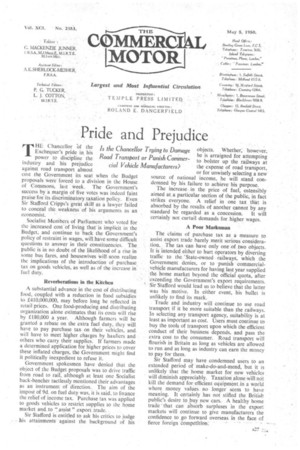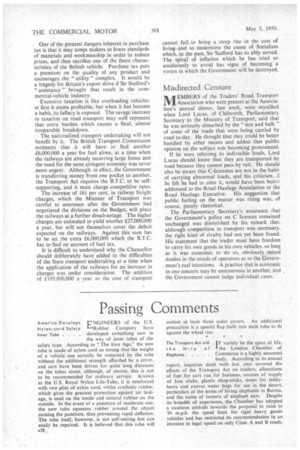Pride and Prejudice
Page 29

Page 30

If you've noticed an error in this article please click here to report it so we can fix it.
is the Chancellor Trying to Damage Road Transport or Punish Commercial Vehicle Manufacturers? THE Chancellor 'of the Exchequer's pride in, his power to discipline the industry and his prejudice • against road transport almost cost the Government its seat when the Budget proposals Were' forced to a division in the House of Commons, last week. The Government's success by a margin of five votes was indeed faint praise for its discriminatory taxation policy_ Even Sir Stafford Cripps's great skill as a lawyer failed to conceal the weakness' of his arguments as an economist.
Socialist Members of Parliament who voted for the increased cost' of living that is implicit in the Budget. and continue to back the Government's policy of restraint in wages, will have some difficult questions to answer in their constituencies. The public is in no doubt of the likelihood of a rise in some bus fares, and housewives will soon realize the implications of the introduction of purchase. tax on goods vehicles, as well as of the increase in fuel duty.
Reverberations in the Kitchen A substantial advance in the cost of distributing food, coupled with a reduction in food subsidies to £410,000,000, may before long be reflected in retail prices. One food-producing and distributing organization alone estimates that its costs will rise by £180,000 a year. Although farmers will be granted a rebate on the extra fuel duty, they will have to pay purchase tax on their vehicles, and will have to meet higher charges by hauliers and others who carry their supplies. If farmers made a determined application for higher prices to cover these inflated charges, the Government might find it politically inexpedient to refuse it.
Government spokesmen have denied that the object of the Budget proposals was to drive traffic from road to rail, although at least one Socialist back-bencher tactlessly mentioned their advantages as an instrument of direction. The aim of the impost of 9d. on fuel duty was, it is said, to finance the relief of income tax. Purchase tax was applied to goods vehicles to restrict supplies to the home market and to "assist " export trade.
Sir Stafford is entitled to ask his critics to judge his attainments against the background of his objects. Whether; however, he is arraigned for attempting to bolster up the railways at the expense of road -transport, or for unwisely selecting a new source of national income, he will stand condemned by his failure to achieve his purpose. The increase in the price of fuel, ostensibly aimed at a partictfiar section of the public, in fact strikes everyone. A relief in one tax that is absorbed by the results of another cannot by any standard be regarded as a concession. It will certainly not curtail demands for higher wages.
A Poor Marksman The claims of purchase tax as a measure to assist export trade barely merit serious considera.tion. The tax can have only one of two objects. It is intended either to hurt operators by diverting traffic to the 'State-owned railways, which the Government denies, or to -punish commercialvehicle manufacturers for having last year supplied .the home market beyond the official quota, after 'exceeding the Government's export requirements. SirStafford would lead us to believe that the latter was his motive. In either event, his bullet is unlikely to find its mark.
Trade and industry will continue to use road transport if it be more suitable than the railways. In selecting any transport agency, suitability is at least as important as cost. Users must continue to buy the tools of transport upon which the efficient conduct of their business depends, and pass the extra cost to the consumer. Road transport will flourish in Britain as long as vehicles are allowed to run and as long as industry can earn the money to pay for them.
• Sir Stafford may have condemned users to an extended period of make-do-and-mend, but it is unlikely that the home market for new vehicles will diminish appreciably. Taxation alone will nOt kill the demand for efficient equipmentin a world where money values, no longer seem to have meaning. It certainly has not stifled the British public's desire to buy new cars. A healthy home trade that can absorb surpluses in the export markets will continue to give manufacturers the confidence to go forward overseas in the face of fierce foreign COmpethion: ' — • One of the greatest dangers inherent in purchase tax is that it may tempt makers to lower standards of materials and workmanship in order to reduce prices, and thus sacrifice one of the finest characteristics of the British vehicle. Purchase tax puts a premium on the quality of any product and encourages the " utility " complex. It would be a tragedy for Britain's export drive if Sir Stafford's " assistance " brought that result in the commercial-vehicle industry. Excessive taxation is like overloading vehicles: at first it seems profitable, but when it has become a habit, its fallacy is exposed. The savage increase in taxation on road transport may well represent that extra burden which causes a final, almost irreparable breakdown. The nationalized transport undertaking will not benefit by it. The British Transport Commission estimates that it will have to find another £6,000,000 a year for fuel alone, at a time when the railways are already incurring large losses and the need for the most stringent economy was never more urgent. Although, in effect, the Government is transferring money from one pocket to another. the Transport Act requires the B.T.C. to be selfsupporting, and it must charge competitive rates. The increase of 16i per cent. in railway freight charges, which the Minister of Transport was careful to announce after the Government had negotiated the divisions on the Budget, will place the railways at a further disadvantage. The higher charges are estimated to yield another £27,000,000 a year, but will not themselves cover the deficit expected on the railways. Against this sum has to be set the extra £6,000,000 which the B.T.C. has to find on account of fuel tax. It is difficult to understand why the Chancellor should deliberately have added to the difficulties of the State transport undertaking at a time when the application of the railways for an increase in charges was under consideration. The addition of £105.000,000 a year to the cost of transport cannot fail to bring a. steep rise in the cost of living, and to undermine the cause of Socialism which, in the past, Sir Stafford has so ably served. The spiral of inflation which he has tried so assiduously to avoid has signs of becoming a -vortex in which the Government will be destroyed.
Misdirected Censure MEMBERS of the Traders' Road Transport Association who were present at the Association's annual dinner, last week, were mystified when Lord Lucas, of Chilworth, Parliamentary Secretary to the Ministry of Transport, said that he was seriously disturbed by the " size and bulk" of some of the loads that were being carried by road to-day. He thought that they could be better handled by other means and added that public opinion on the subject wss becoming pronounced. If he were referring to indivisible loads, Lord Lucas should know that they are transported by road because they cannot pass by rail. He should also be aware that C-licensees are not in the habit of carrying abnormal loads, and his criticism, he felt he had to utter it, would have been bett,:r addressed to the Road Haulage Association or the Road Haulage Executive. His suggestion that public feeling on the matter was rising was, of course, purely rhetorical. The Parliamentary Secretary's assurance that the Government's policy on C licences remained unchanged was diminished by his remark that, although competition in transport was necessary. the right kind of rivalry had not yet been found. His statement that the trader must have freedom to carry his own goods in his own vehicles, so long as it was economic to do so, obviously raised doubts in the minds of operators as to the Government's real intentions. A practice that is economic in one concern may be uneconomic in another, and the Government cannot judge individual cases.
























































































